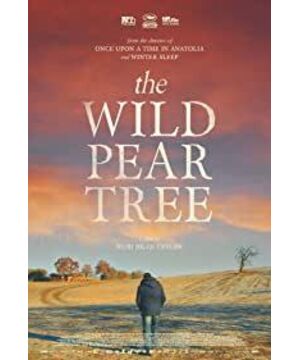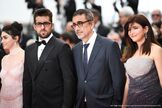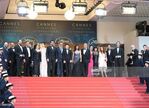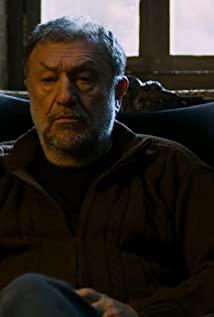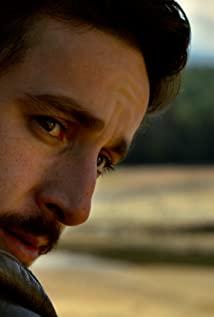Geoff Andrew: How did this movie come about?
NBC: By chance, really. At the time I was working on another project with my wife. It was a summer, just in time for a religious holiday, and we went to my hometown to escape the crowds. There I had many pleasant conversations with a cousin's husband. Although he was a teacher and a very interesting companion, I found that he was not very respected in the village. So did my father, who was also a teacher: in the country, if you were an outlier and behaved differently in many ways, people would make fun of you. I told Able that I wanted to make a film about such a person; then I remembered that this person has a son, Akin, who is about to graduate from Canakkale. So I visited Akin and told him my thoughts on the film, and since he's a journalist -- he's also written two books -- I asked him to write some memories of his father and send it to me. Able and I went back to another project, but after a few months, Arkin emailed me an 80-page memoir. I really liked what he wrote, so I decided to make the movie first and asked Ah Jin to work with us on the script.
Geoff Andrew: So it's not one of your "Chekov" movies...
NBC: (laughs) Not this time. Of course there are still classics.
Geoff Andrew: What is your core focus? An image of Cena, his relationship with his father, or a picture of that country town world?
NBC: Arkin's text is developed by depicting his childhood. When he came from the country to stay in my studio for a month, we decided to focus on the son rather than the father; I've always wanted to make a film about young Turkish people, and this time it was possible. So we thought about what a young would-be writer might face in the country; the fact that Heenan is a lot like Ah Jin means I can ask Ah Jin for details. We don't really know if Heenan actually loves writing, or just using that reasoning as a way for him to take the place where he grew up out of his personal system. Possibly both.
Geoff Andrew: Arkin also plays Imam Wiesel.
NBC: Yes. At the last minute, the cast identified at the casting didn't show up, so I told Ah Jin that he'd come in for that role. I think he can do it, we write the script together, and he is familiar with the dialogue.
Geoff Andrew: Did you also draw on yourself and your own experience?
NBC: Of course. I grab so much from my life, from my father's life, and even sometimes from Albreu's life. But most is Akin's life. Just like Sinan, Akin was determined to be a teacher in his studies, but he did not obtain a teaching certificate for many years, and he was always worried that he would be sent to teach in Eastern Turkey. In fact, during filming, Ah Jin had to leave to take the exam just when I needed him.
Geoff Andrew: Cena is naive, arrogant, and judgmental. Are you worried that the audience thinks he's unsympathetic?
NBC: The key point for me is that the audience should be unsure if they like him or not; it's the same for his father -- in fact, for all the characters. We cannot decide whether they are good or bad. It's like life. We might start disliking certain people, and then they do something or say something that makes us start liking them a little bit. Or vice versa. Hollywood movies expect us to love or hate a character right away, but I try to keep the inconsistency between characters in the movie so that the audience can't easily judge. I try to figure out what it is to be alive and what it is to be human, and I do that by thinking about what I observe in real life.
Geoff Andrew: Sheenan's father is extraordinarily real.
NBC: Idris has a lot of layers to his personality, so sometimes he seems sympathetic and sometimes annoying. Heenan's father's gambling and indifferent attitude towards life made Heenan feel ashamed. He's in gambling debt, but he obviously doesn't care, he always looks happy: life is unbearably light! The role of Idris comes from Arkin's father. As far as I know I like him, but I only see one side of him; on the other hand, he lost a house because of his gambling addiction, for example. That's one of the reasons the villagers didn't like him - they just weren't interested in what he was interested in.
Geoff Andrew: This is also a film about Turkey today. Most obviously, you devised a plot where Heenan laughs when a police friend brags about hitting a student; however there are other subtle details that could be seen as political.
NBC: I wanted to show the issues young people face in their lives. All the situations Sinan finds in are drawn from the experiences of young people living in Turkey today. The phone conversation with the police side came from what I saw with my own eyes. The film is about the problems faced by a would-be literature teacher, many of whom end up having to work in the police department.
But Heenan's reaction to the police was partly ostentation and partly an expression of sympathy for his friend all along. It's not that he agrees with his friend's feelings; he just doesn't want to offend him. He has a lot of that arrogant way of speaking, which is actually his self-preservation; he justifies his adulthood and importance by implying that he is superior to others. Many of us do this when we are young. Years ago I worked in a Wimby pub in London and I would talk to the manager and he wasn't very educated so he couldn't understand me; that was my way of trying to get him to respect me. At that age, conversations often don't reveal reality at all; it's just about profiting from someone.
So you might say it's a political movie because it reflects aspects of Turkish society today, but those are really just background. To me, any political element exists only because it makes the characters more dazzling. So, while those long conversations with the Imam may have shed some light on attitudes toward religion today, it's more about what Sinan wants from the Imam. It can also be seen that despite his own frequent criticism, he would not allow anyone to speak ill of his father. He is like his mother, although she has her own complaints about her husband, she will never allow Heenan to complain too much about her father.
Geoff Andrew: The film has a daring approach to time: some deeply extended scenes play out in real time; elsewhere, cuts and omissions suddenly take us forward in unexpected ways, even disorienting; and Cena's military career was completely replaced by a strange and short episode.
NBC: It's hard to say because these decisions are very intuitive. However, during the period of military service, I needed a period of transition, because the change of Xinan's attitude was born of guilt towards my father, which required a transition of time. He joined the military with a sense of guilt he had never felt before—that it can change a person. Because of my own relationship with my dad, I know that one day you will realize there are things you don't really understand. I myself needed guilt and time—my military service period for me—to change my attitude toward him.
Geoff Andrew: The film is unusually loose in its handling of such a wide range of multi-dimensional characters and situations.
NBC: Yeah, but all those different things are connected. We worked really hard on this when we wrote the script. The first draft might have resulted in an almost five-hour movie, but some elements of it didn't relate well, so I cut them out. So now, let's say the jeweler we briefly see in an early scene is mentioned later by another important character. But I don't like making these connections too obvious. It's even better if the audience can slowly discover something that makes them more active as a spectator. In Turkey, many people who liked the film watched it a second time; the related structures throughout the film gave people the motivation to watch it again. That's probably why my long films are more popular after their first release, because people can watch DVDs over and over again.
Geoff Andrew: As always, the film is visually beautiful.
NBC: But actually this time around, I'm less bothered by that. In those scenes where the characters are walking around, I use a small Osmo camera; the picture quality is not that perfect, but I want to keep capturing them. I also don't want them just talking in one room all the time. In the script, the long dialogue scene between Heenan and the Imam takes place in a cafe, but when we actually shot, I realized that wouldn't work, so I changed the script so that the scene starts with an apple tree, Then they walked to the cafe while chatting. In fact, we couldn't find a good apple tree at the time, so we had to use a walnut tree instead, hoping no one noticed!
Geoff Andrew: Did you worry about the length of this scene?
NBC: Yeah, it's 20 minutes long. But it's the film's unique selling point. If you don't understand Turkish and have to watch subtitles, this scene will likely feel longer. But it's important to me because it involves different attitudes toward religion: for example, one character is a reformer, the other an agnostic. This is another aspect of Sinan's life in the country.
Geoff Andrew: You come across as a perfectionist. Do you agree?
NBC: (laughs) Well, when you know it's possible to do something better, it's hard not to try not to do it.
(Turn)
View more about The Wild Pear Tree reviews


